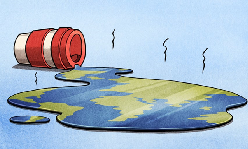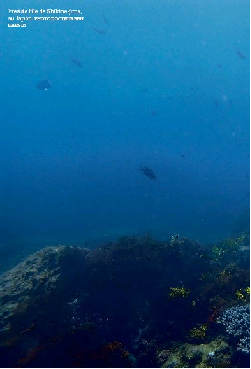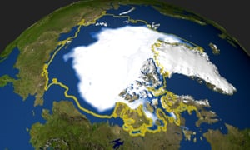September 2018 Sustainable Development
Read the articles selected in September 2018
We won’t save the Earth with a better kind of disposable coffee cup
By George Monbiot
Source: https://www.theguardian.com

We must not confuse the ecology with another consumerism style. The sustainability can’t do without a radical reduction of mass consumptions, in the opposite direction of the relentless economic growth.
Read more:
“Direct existential threat” of climate change nears point of no return, warns UN chief
Source: http://asvis.it/

UN Secretary-General Guterres has announced a new Climate Summit with the intent to hit the dependency on fossil fuels of still too many countries, which not only brakes climate action but also harms socio-economic progress in terms that transcend monetary figures.
Read more:
https://news.un.org/en/story/2018/09/1018852
Food security and nutrition in the world
Source: http://www.who.int
The poor and the poorest countries are the most exposed to the effects of climate change. Sustainable development is the only believable growth, because it is inclusive and resilient, delivering at the same time a higher productivity in a low carbon economy.
Read more:
Climate change made this monster
By Eric Holthaus
Source: The Washington Post, 14 September
Never before Florence has a hurricane arrived so far north. While we experience already its consequences, nothing has changed in the way we face climate change, in our procrastination and half measures. 2017 has reached the record of greenhouse gases in human history.
CO2 La mer défoncée à l’acide
By Aurore Coulaud & Aude Massiot
Source: Libération, 31 Augost

CO2 is the major responsible for marine acidification, hindering the growth of plankton. By the end of this Century, it is expected a triplication of acidity rates since the begin of the industrial revolution, with consequences on marine species and the food chain.
What matters the most to people?
By Carlotta Balestra, Romina Boarini, Elena Tosetto
Source: http://www.oecd.org/

The Better Life Index is an Oecd platform where citizens can express their preferences across a set of dimensions of well-being. For public policy, information on what people think matters the most in life is important to defining priorities on budget allocations.
Read more:
Unlocking the inclusive growth story of the 21st Century: accelerating climate action in urgent times
Source: The Global Commission on the Economy and Climate
The new growth means higher productivity, economic resilience and greater social inclusion. Technological innovation, appropriate regulations, and infrastructure investments are the drivers of a progress which includes more livable cities, clean energy systems, a sustainable and efficient agriculture.
Read more:
https://newclimateeconomy.report/2018/wp-content/uploads/sites/6/2018/09/NCE_2018_FULL-REPORT.pdf
Le SOS de 700 scientifiques
Source: Libération, 8 September

The policy-makers have the task to set up the legislative, institutional, monetary and fiscal conditions for the shift to a world without carbon. The carbon neutrality must be a primary political goal, an essential part of any governments’ action.
Gare aux aliments ultratransformés!
By Anne Crignon
Source: L’Obs, 6 September
A French committee of inquiry has been concerned about fake food, a decisive factor for the major chronic diseases. Fake food introduces into our organism calories and additives without nutritional elements, that get destroyed in the industrial cracking process.
Making technological innovation work for sustainable development
By Laura Diaz Anadon, Gabriel Chan, Alicia G. Harley, Kira Matus, Suerie Moon, Sharmila L. Murthy & William C. Clark
Source: https://green.harvard.edu/
Technological innovation is at the heart of sustainable development, meant as the progress of well-being for all. To be achieved, innovation requires systemic change and adaptation involving many actors, such as the institutions. The lack of rules and appropriate policies risks to miss the final goal.
Read more:
http://www.pnas.org/content/early/2016/08/11/1525004113
The impact of exposure to air pollution on cognitive performance
By Xin Zhang, Xi Chen & Xiaobo Zhang
Source: PNAS, 27 August
This study carried out in China shows the effect of polluted air on the cognitive ability, measured in verbal and math tests, providing evidence of the damage produced especially on ageing and less educated people, with negative consequences on their daily life.
Read more:
http://www.pnas.org/content/early/2018/08/21/1809474115
Pollution is slowing the melting of Arctic ice, for now
ByJohn Abraham
Source: The Guardian, 3 August

While greenhouse gases warm the planet, aerosols cool the atmosphere by blocking sunlight. Scientists have detected in the Arctic ice, the first thermometer of climate change, the presence and the cooling effect of aerosols. But coming to terms with pollution is not a solution.
Read more:
D’après l’ONU, les engagements de réduction des émissions de gaz à effet de serre pris jusqu’à présent par les Etats signataires de l’accord de Paris conduiraint à un monde a +3°C. Une mise en garde qui acte l’urgence de la situation et devrait inciter
Source: Libération, 29 August
The inexorable consequences of climate change already observed in the last decades produce a chain of effects that in a short time will lead the Earth to a 3°C increase. Put aside any doubt on the human responsibility, changing system of thought and action is urgent and necessary.
See attached
Significant milestone reached in scaling up anti-corruption collective action
Fonte: https://www.unglobalcompact.org
Two projects linked with the SDG 16, which promotes peace and justice and is focused on the building of strong institutions, intended to raise awareness about the revenues of integrity and the importance of prevention, made possible through more transparency and by creating an enabling environment for businesses.
Read more:https://www.unglobalcompact.org/news/4398-08-07-2018
La qualité des produits agricoles se dégrade sous l’effet du réchauffement climatique
ByMarc Cherki
Source: Le Figaro, 31 August
After a study of Harvard published in Nature Climate Change, in the future the population in the world, and in particular in the less developed countries, will suffer from nutritional deficiencies because of the loss of nutritional qualities induced from the increased CO2 in the most common plants of our diet.
See attached
Info
- Pubblicato il : 01/10/2018 Modificato il : 04/04/2019

